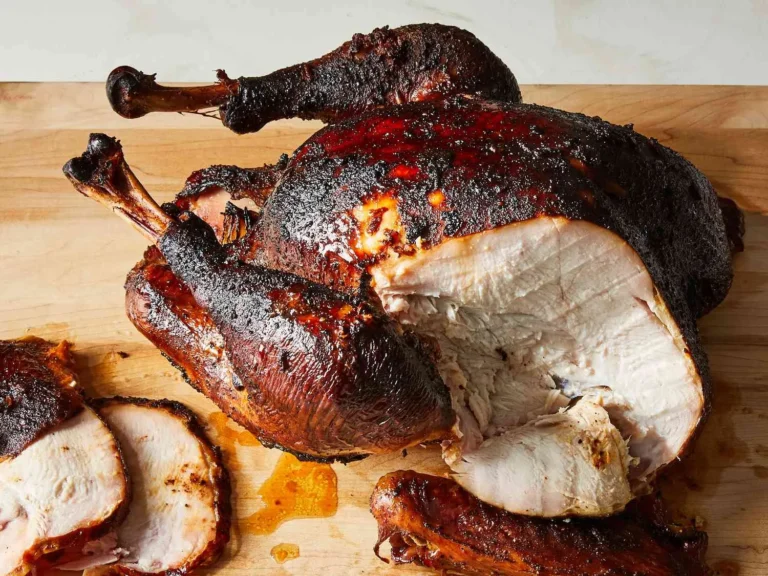Gas vs Charcoal vs Electric Grills
Grilling is more than just a way to cook food; it’s a cherished ritual, a social event, and a celebration of flavors. Whether you’re a weekend warrior or a seasoned pitmaster, choosing the right grill can make a significant difference in your BBQ cookouts. Today, we dive into the ongoing debate: Gas vs Charcoal vs Electric Grills. Let’s explore the ins and outs of each grill type to help you make an informed decision.
Choosing the right grill is crucial for any barbecue enthusiast. Each type of grill—gas, charcoal, and electric—offers unique benefits and drawbacks that can influence your grilling experience. From the convenience and control of gas grills to the authentic smoky flavor of charcoal grills and the urban-friendly electric grills, understanding these differences can help you pick the best tool for your needs.
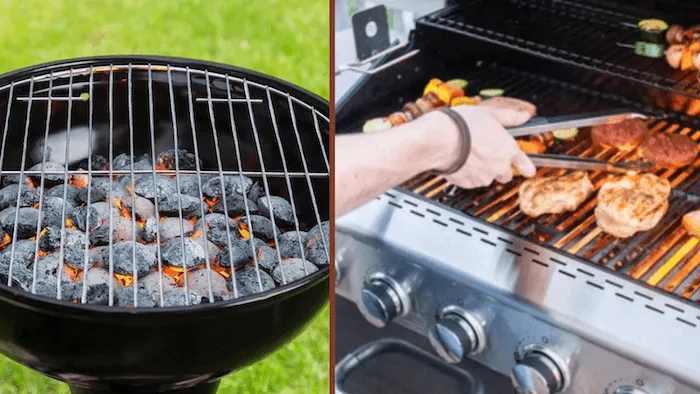
What is a BBQ Grill?
A BBQ grill, or barbecue grill, is an apparatus designed for cooking food by applying heat from below. Essentially, a BBQ grill is the cornerstone of outdoor cooking, and it is heavily associated with the social events of backyard cookouts and summer parties. The term “barbecue” itself has a rich history and is believed to originate from the Caribbean term “barbacoa,” which refers to a wooden structure used by the Taino people for cooking food over a fire.

There are three main types of BBQ grills: charcoal, gas, and electric. These categories are primarily defined by the source of heat they use to cook food.
- Charcoal Grills: This type of grill uses charcoal briquettes or lump charcoal as its fuel and ignition source. Charcoal grills are known for imbuing food with a distinct, smoky flavor that is often sought after by BBQ enthusiasts. They come in different styles, such as kettle grills or larger barrel grills, each offering a slightly different grilling experience.
- Gas Grills: Gas grills are fueled by either propane or natural gas. These grills are known for their convenience and control, allowing for precise temperature adjustments, an aspect that makes them quite popular. Gas grills often come equipped with various features like side burners, rotisseries, and multiple cooking zones to enhance the cooking experience.
- Electric Grills: These grills operate by plugging into an electrical outlet. They use heated grill plates to cook food and are most often used when outdoor grilling isn’t possible due to space restrictions or regulations, such as in apartments or condos. Electric grills are usually the smallest type and are valued for their convenience and ease of use.
In all three types, the heat source is placed below the cooking grate and food is cooked either through direct grilling (food is placed directly above the heat source) or indirect grilling (food is placed in a section with no direct heat beneath it). With this diversity, BBQ grills cater to a wide variety of cooking styles, tastes, and lifestyles.
GAS GRILLS: The Connoisseur’s Choice
A top choice among discerning gentlemen, gas grills are known for their convenience, speed, and control. These grills work with either propane tanks or natural gas lines, offering quick and easy ignition and rapid preheating.
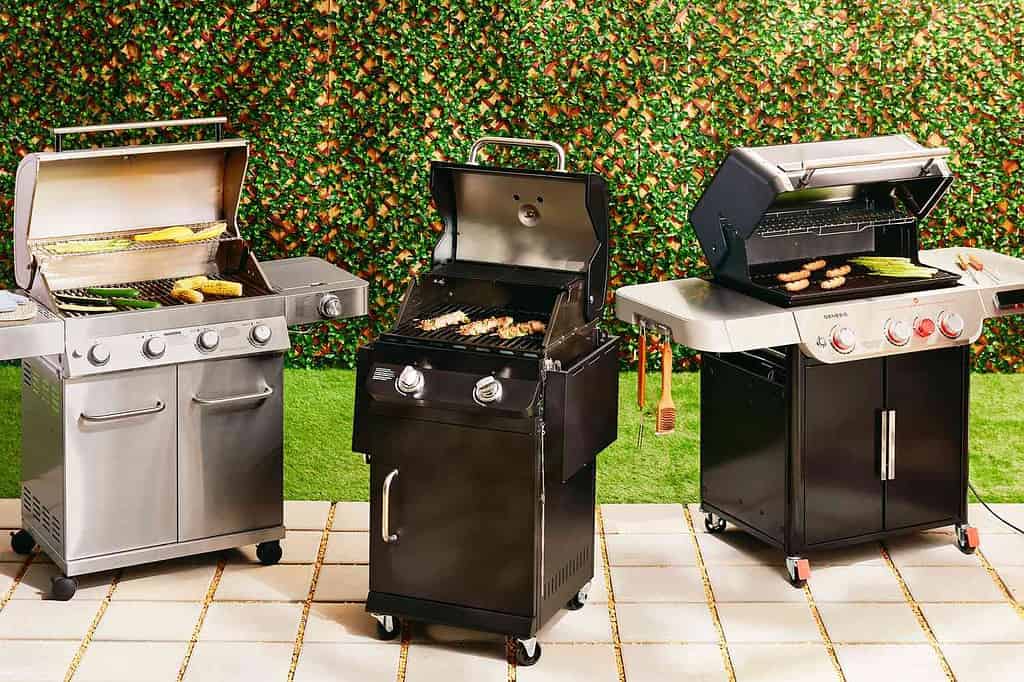
Pros and cons:
Pros:
- Ease and Speed: Gas grills are almost effortless to start and require little pre-heating time, typically 10 to 15 minutes. Perfect for impromptu grilling sessions or when time is of the essence.
- Temperature Control: They offer precise control over heat, with knobs similar to your kitchen stove. Ideal for cooking different cuts and types of meat that require exact temperatures.
- Cleanup: They are relatively easy to clean, with no ashes to worry about.
- Versatility: Many gas grills come with added features like side burners, warming zones, and rotisseries.
Cons:
- Flavor: The most significant trade-off with gas grills is the lack of smoky flavor that charcoal grills offer.
- Cost: Gas grills tend to be more expensive initially compared to charcoal grills, though the ongoing cost can be less, especially with natural gas.
- Portability: Propane gas grills can be moved around, but if you’re using a natural gas line, your grill is more or less stationary.
Ideal Scenarios for Gas Grills:
Gas grills are excellent for those who grill frequently and value convenience, control, and cleanliness. They’re also perfect for hosting, given their versatility and quick start-up time. Pair your grilling session with a glass of smooth bourbon, and you have the perfect soiree.
CHARCOAL GRILLS: The Traditionalist’s Delight
Charcoal grills, the original grilling method, remain wildly popular for one reason: flavor. The smoky, rich taste that a charcoal grill imparts to the meat is unrivaled.
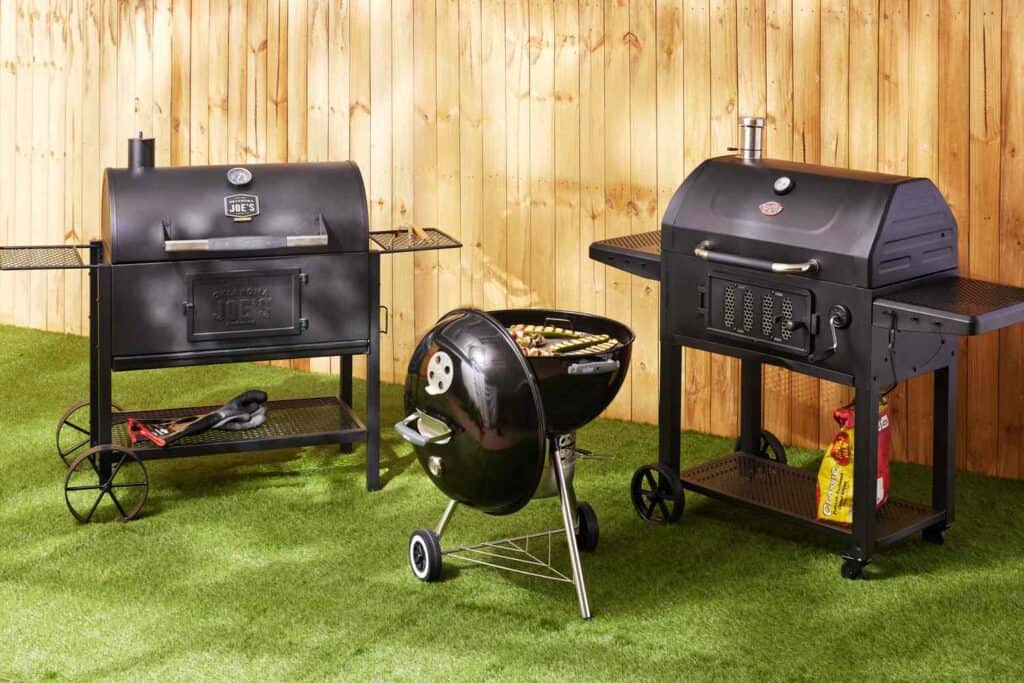
Pros and Cons
Pros:
- Flavor: Charcoal grills offer that classic, smoky flavor that barbecue enthusiasts swear by.
- Heat: Charcoal can achieve higher heat than gas, ideal for searing meats to perfection.
- Cost: Charcoal grills are generally cheaper than gas grills in terms of initial investment.
- Portability: Charcoal grills come in various sizes, including compact options that are perfect for camping or tailgating.
Cons:
- Time-Consuming: Starting a charcoal grill and getting it to the right temperature takes time and practice.
- Temperature Control: Controlling heat in a charcoal grill is trickier and requires experience.
- Cleanup: Post-grill cleanup can be a bit messy with the ashes.
Ideal Scenarios for Charcoal Grills:
If you are a purist who loves a smoky flavor, a charcoal grill is a perfect companion. It’s a hands-on experience, requiring skill and patience, but the result is truly worth it.
ELECTRIC GRILLS: The Modernist’s Preference
Compact, convenient, and smoke-free, electric grills are the new kids on the block. Ideal for those with space constraints or strict community rules, these grills bring the joy of grilling to apartments and condos.
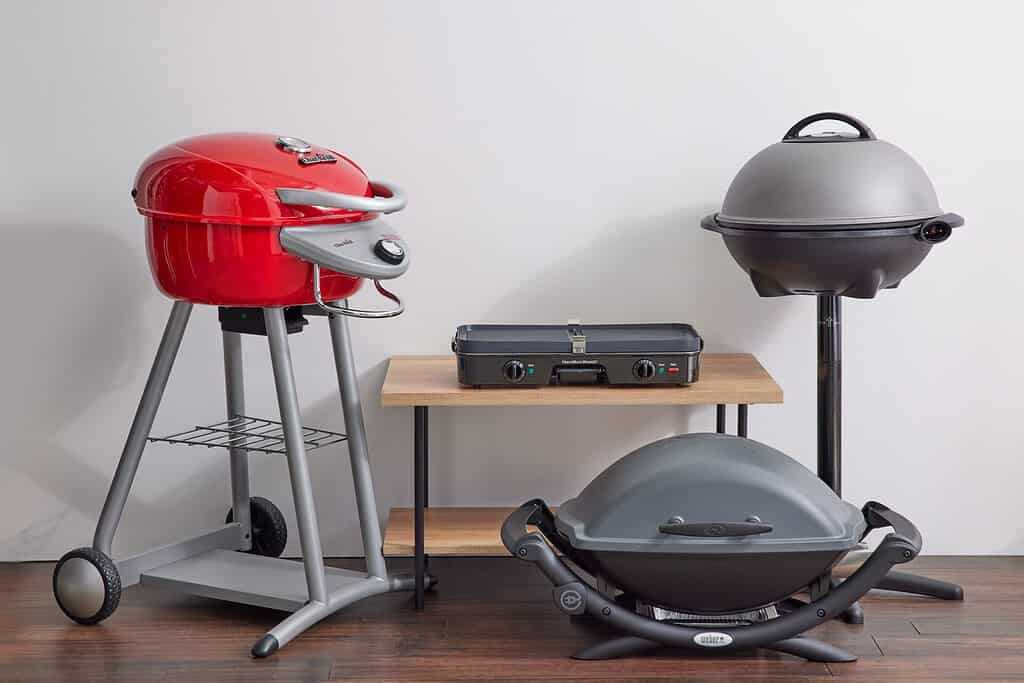
Pros and Cons
Pros:
- Convenience: Simply plug it in, and you’re ready to grill. No worries about propane tanks, charcoal, or ash.
- Compact and Portable: Electric grills are typically smaller, perfect for balconies or small patios.
- Smokeless: Electric grills produce very little smoke, making them ideal for indoor grilling or places with strict fire codes.
Cons:
- Flavor: Electric grills do not impart the smoky flavor that gas or charcoal grills do.
- Heat: They usually don’t reach the same high temperatures as gas or charcoal grills.
- Dependency on Electricity: You need a power outlet nearby to operate, which could limit where you can use it.
Ideal Scenarios for Electric Grills:
Electric grills are best suited for city dwellers living in condos or apartments, where space is at a premium and fire regulations might prevent the use of gas or charcoal grills. They are also perfect for indoor grilling during inclement weather, ensuring that your grilling plans are never foiled.
Making Your Choice
- For Flavor Enthusiasts: Charcoal grills are the way to go. If you’re after that authentic smoky flavor and enjoy the process of tending to the coals, a charcoal grill will deliver superior taste.
- For Convenience Seekers: Gas grills offer the best of both worlds with easy ignition, precise temperature control, and a variety of features to enhance your grilling experience.
- For Urban Dwellers: Electric grills are perfect for those with limited space or strict fire regulations. They’re easy to use, safe, and require minimal clean-up.
Each grill type has its own merits, so consider your lifestyle, grilling frequency, and taste preferences before making a decision. Whether you’re searing steaks, slow-cooking ribs, or grilling veggies, the right grill can elevate your outdoor cooking game.
Disclosure: Our blog contains affiliate links to products. We may receive a commission for purchases made through these links. However, this does not impact our reviews and comparisons. We try our best to keep things fair and balanced, in order to help you make the best choice for you.






